
Petersburg is an independent city in the Commonwealth of Virginia in the United States. As of the 2020 census, the population was 33,458 with a majority African American. The Bureau of Economic Analysis combines Petersburg with Dinwiddie County for statistical purposes. The city is 21 miles (34 km) south of the commonwealth (state) capital city of Richmond.

Barren County is a county located in the south-central portion of the U.S. state of Kentucky. As of the 2020 census, the population was 44,485. Its county seat is Glasgow. The county was founded on December 20, 1798, from parts of Warren and Green Counties. It was named for the Barrens, meadowlands that cover the northern third, though actually the soil is fertile. Barren County is part of the Glasgow, KY Micropolitan Statistical Area, which is also included in the Bowling Green-Glasgow, KY Combined Statistical Area. In 2007 Barren County was named the "Best Place to Live in Rural America" by Progressive Farmer Magazine.

Newville is a town in Henry County, Alabama, United States. It is part of the Dothan, Alabama Metropolitan Statistical Area. At the 2020 census, the population was 544.

Courtland is an incorporated town in Southampton County, Virginia, United States. It is the county seat of Southampton County.

Elliston is a census-designated place (CDP) in Montgomery County, Virginia, United States. It lies between the city of Roanoke and the town of Christiansburg in the southwestern part of the state. The population as of the 2010 Census was 902. It is home to a small fire department, an elementary school, two gas stations, a train stop, and several churches. Most of its residents commute to larger towns. A set of railroad tracks separates the northwestern part of the town from the rest. US highway 11-460 further divides the town into two distinct neighborhoods, "Oldtown," which formed along the Valley Road in the 1850s, and "The Brake," a predominantly African-American area that developed after the Civil War.
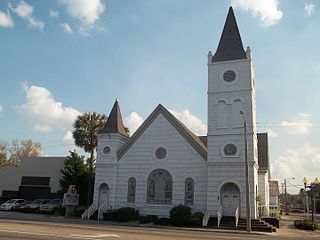
The black church is the faith and body of Christian denominations and congregations in the United States that minister predominantly to, and are led by, African Americans, as well as these churches collective traditions and members. The term "black church" may also refer to individual congregations in traditionally white denominations.
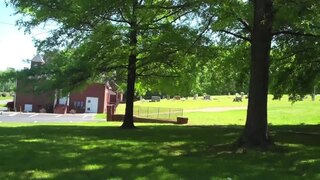
The Rosenwald School project built more than 5,000 schools, shops, and teacher homes in the United States primarily for the education of African-American children in the South during the early 20th century. The project was the product of the partnership of Julius Rosenwald, a Jewish-American clothier who became part-owner and president of Sears, Roebuck and Company and the African-American leader, educator, and philanthropist Booker T. Washington, who was president of the Tuskegee Institute.
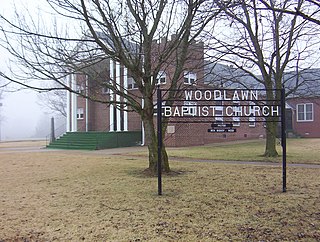
Woodlawn Baptist Church and Cemetery, also known as Woodlawn Missionary Baptist Church, is a historic building in Nutbush, Haywood County, Tennessee, in the United States. It is on Woodlawn Road, south of Tennessee State Route 19.
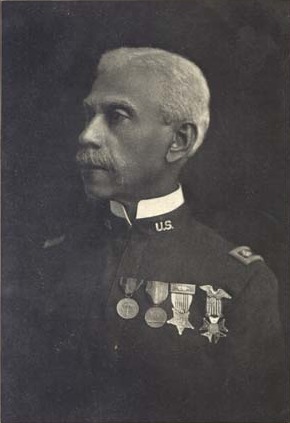
Allen Allensworth was an American chaplain, colonel, city founder, and theologian. Born into slavery in Kentucky, he escaped during the American Civil War by joining the 44th Illinois Volunteers as a Union soldier. After being ordained as a Baptist minister by the Fifth Street Baptist Church, April 9, 1871, he worked as a teacher, led several churches, and was appointed as a chaplain in the United States Army. In 1886, he gained appointment as a military chaplain to a unit of Buffalo Soldiers in the West, becoming the first African American to reach the rank of lieutenant colonel in the United States Army. He served in the Army for 20 years, retiring in 1906.
Lyles or Lyles Station is an unincorporated community in Patoka Township, Gibson County, Indiana. The community dates from 1849, although its early settlers first arrived in the 1830s, and it was formally named Lyles Station in 1886 to honor Joshua Lyles, a free African American who migrated with his family from Tennessee to Indiana around 1837. Lyles Station is one of Indiana's early black rural settlements and the only one remaining. The rural settlement reached its peak in the years between 1880 and 1912, when major structures in the community included the railroad depot, a post office, a lumber mill, two general stores, two churches, and a school. By the turn of the twentieth century, Lyles Station had fifty-five homes, with a population of more than 800 people. The farming community never fully recovered from the Great Flood of 1913, which destroyed much of the town. Most of its residents left for economic reasons, seeking opportunities for higher paying jobs and additional education in larger cities. By 1997 approximately fifteen families remained at Lyles Station, nearly all of them descended from the original settlers.

Cairo Rosenwald School is a former school for African-American children located in the unincorporated community of Cairo, Sumner County, Tennessee. It was one of seven Rosenwald schools built in the county.

Durham's Chapel School, also known as Durham's Chapel Rosenwald School, is a former school for African-American children located in Gallatin, Tennessee, that is listed on the National Register of Historic Places.

The Hope Rosenwald School, also known as Hope School, is a former school at 1971 Hope Station Road near Pomaria, South Carolina. As a Rosenwald School, it served rural African-American children in the early 20th century.

Liberty Colored High School is a former high school for African-American students in Liberty, South Carolina during the period of racial segregation. It originally was called Liberty Colored Junior High School. The building is now a community center known as the Rosewood Center. It is at East Main Street and Rosewood Street in Liberty. The school was built in 1937 on the site of a Rosenwald school that had burned down.
Guildfield Missionary Baptist Church is a historic African-American church on Guildfield Church Road in South Guthrie, Tennessee.

The National Baptist Convention, USA, Inc., more commonly known as the National Baptist Convention, is a primarily African American Baptist Christian denomination in the United States. It is headquartered at the Baptist World Center in Nashville, Tennessee and affiliated with the Baptist World Alliance. It is also the largest predominantly Black Christian denomination in the United States and the second largest Baptist denomination in the world.
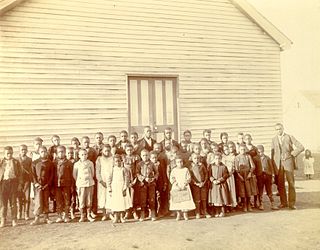
Cadentown School in Lexington, Kentucky was a primary public school for black children in the segregated Fayette County Public Schools from about 1879 to 1922. The building that originally housed Cadentown School, located at 705 Caden Lane, is no longer extant. However, the Rosenwald Fund School is listed on the National Register of Historic Places in Fayette County.

The Allen-White School, also known as Hardeman County Training School, was a Rosenwald school in Whiteville, Tennessee, United States, that is listed on the National Register of Historic Places.
Lyttonsville is a mostly residential neighborhood of Silver Spring, Maryland. Established in the 1850s, it is among the oldest neighborhoods in Montgomery County and is a notable example of a community created by free African Americans before the Civil War. Today, Lyttonsville is a 68-acre, predominantly residential neighborhood mostly composed of modest single-family homes.


















